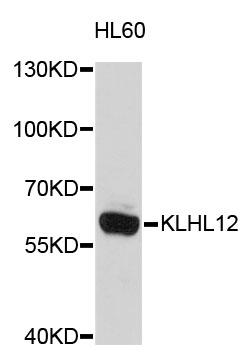-
Product Name
KLHL12 Polyclonal Antibody
- Documents
-
Description
Polyclonal antibody to KLHL12
-
Tested applications
WB
-
Species reactivity
Human, Mouse
-
Alternative names
KLHL12 antibody; C3IP1 antibody; DKIR antibody; kelch-like protein 12 antibody
-
Isotype
Rabbit IgG
-
Preparation
Antigen: A synthetic Peptide of human KLHL12
-
Clonality
Polyclonal
-
Formulation
PBS with 0.02% sodium azide, pH7.3.
-
Storage instructions
Store at 4℃. Avoid freeze / thaw cycles.
-
Applications
WB 1:500 - 1:1000
-
Validations

Western blot - KLHL12 Polyclonal Antibody
Western blot analysis of extracts of HL-60 cells, using KLHL12 antibody .Secondary antibody: HRP Goat Anti-Rabbit IgG (H+L) at 1:10000 dilution.Lysates/proteins: 25ug per lane.Blocking buffer: 3% nonfat dry milk in TBST.
-
Background
Substrate-specific adapter of a BCR (BTB-CUL3-RBX1) E3 ubiquitin ligase complex that acts as a negative regulator of Wnt signaling pathway and ER-Golgi transport. The BCR(KLHL12) complex is involved in ER-Golgi transport by regulating the size of COPII coats, thereby playing a key role in collagen export, which is required for embryonic stem (ES) cells division: BCR(KLHL12) acts by mediating monoubiquitination of SEC31 (SEC31A or SEC31B). The BCR(KLHL12) complex is also involved in neural crest specification: in response to cytosolic calcium increase, interacts with the heterodimer formed with PEF1 and PDCD6/ALG-2, leading to bridge together the BCR(KLHL12) complex and SEC31 (SEC31A or SEC31B), promoting monoubiquitination of SEC31 and subsequent collagen export. As part of the BCR(KLHL12) complex, also acts as a negative regulator of the Wnt signaling pathway by mediating ubiquitination and subsequent proteolysis of DVL3. The BCR(KLHL12) complex also mediates polyubiquitination of DRD4 and PEF1, without leading to degradation of these proteins.
Related Products / Services
Please note: All products are "FOR RESEARCH USE ONLY AND ARE NOT INTENDED FOR DIAGNOSTIC OR THERAPEUTIC USE"
